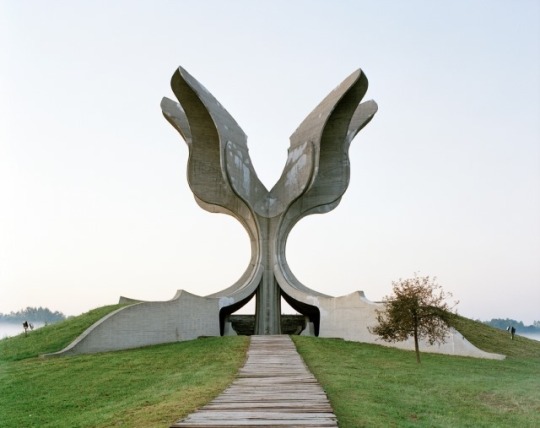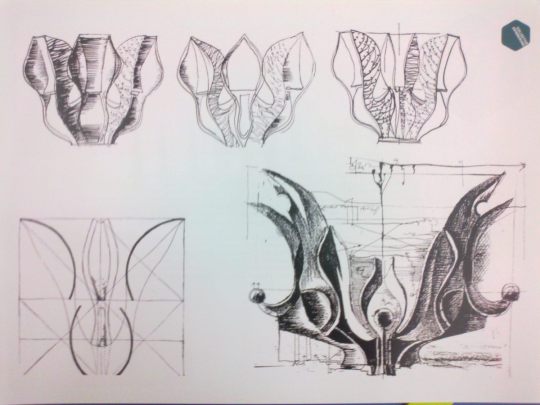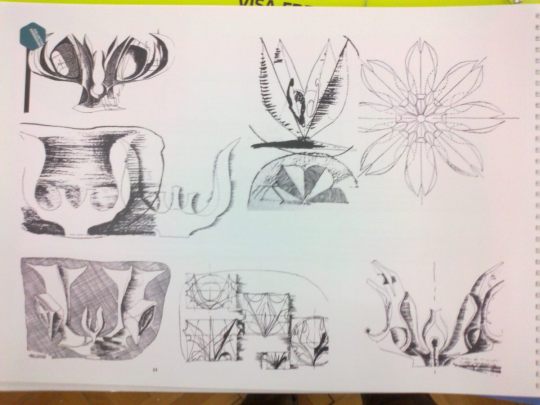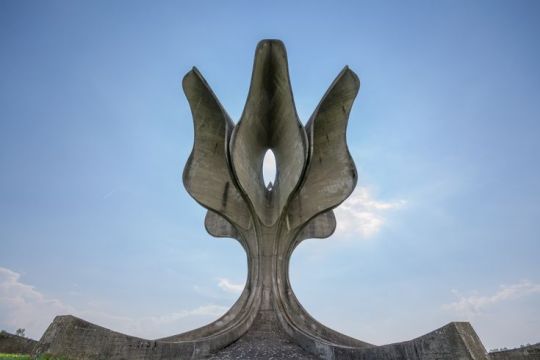#Jasenovac
Explore tagged Tumblr posts
Photo
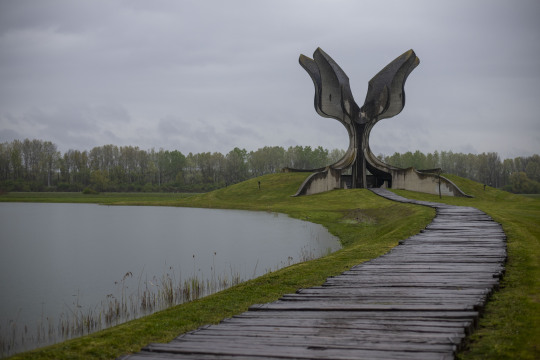
Kameni cvijet.
#stone flower#croatia#hrvatska#Камени цвет#jasenovac#spomenik#spomenikdatabase#lakeside#rainyday#concrete#concrete monument#travelphoto#travelling#travellingman#travelphotography#brutalism#brutalismarchitecture#canontop#canonphoto#emlékmű#beton#tó#eső
17 notes
·
View notes
Link
Unresolved atrocities
#Croatia#Ustache#Jasenovac#death camps#history#Nazi#fascism#barbarity#WWII#genocide#ethnic cleansing#eugenics#dehumanization
2 notes
·
View notes
Text
What Was Christmas Like in Auschwitz or Jasenovac for Jews and Roma?

For Jews and Roma in concentration camps like Auschwitz and Jasenovac, Christmas was not a time of joy—it was a time of suffering and survival.
In Auschwitz, the bitter cold of December brought even more suffering. Prisoners endured freezing temperatures with inadequate clothing and food, and any quiet acts of solidarity, like sharing a piece of bread, came at great risk. The Nazis, ironically, celebrated Christmas with feasts and forced prisoner orchestras to play holiday music, a cruel reminder of the humanity they sought to strip away.
In Jasenovac, operated by the Ustaše, the holiday season often saw increased brutality. Prisoners, mostly Serbs, Jews, and Roma, faced random executions or were forced to participate in cruel spectacles meant to entertain the guards.
For those imprisoned, Christmas was a stark contrast to its promise of peace and goodwill. Yet even in the darkness, small acts of kindness and solidarity reminded them of their shared humanity.
Let us remember their stories this season, honoring their resilience and ensuring such horrors are never repeated.
0 notes
Text
Communist Camp in Jasenovac
During existence of concentration camp in Jasenovac, there were in fact three camps there: Ustashi camp, Communist Partisan camp, and Communist camp for Inforbiro supporters. Igor Vukić, whose grandfather – an Orthodox Serb – was imprisoned in the Jasenovac camp, says that Ustashi camp was a penal one, rather than a death camp. It served the function of preventing potential terrorists (mostly…
0 notes
Text
0 notes
Text
Odbrana vladike Ćulibrka: Ko manipuliše Jasenovcem?
Foto Igor Pavicevic Zašto je polemika oko Jasenovca dalekosežno najvažnija koja se vodi u Srbiji Piše: Dejan Jović (Nedeljnik) Pravi – i sve oštriji, a donekle i bizarniji – “sukob na desnici” odvija se već nekoliko godina unutar Srpske pravoslavne crkve, kao i unutar historiografskih institucija i među nekim istoričarima, u vezi sa brojem žrtava u jasenovačkom logoru. Tema je, dakle, stara –…
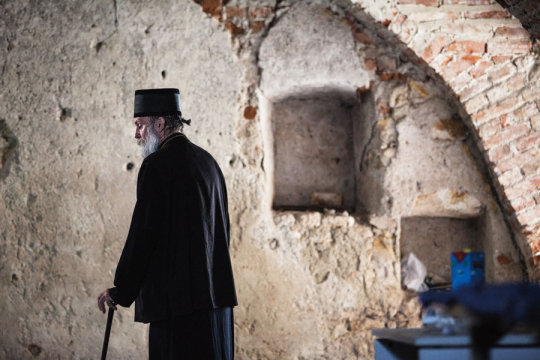
View On WordPress
0 notes
Text

Brave Young Croatian: Ivan Vranetic
Risked His Life To Save Strangers
Ivan “Ivica” Vranetic was a Catholic teenager who saved Croatian Jews from the Nazis by finding safe places for them to hide and providing for their basic needs until the war was over.
Born in Vrbas, Yugoslavia in 1927, Ivan “Ivica’ Vranetic was raised in a Catholic family of Croatian descent that prioritized acts of kindness and respect for one’s fellow. During his childhood, most of Ivica’s neighbors supported the Ustasa, a fascist organization closely linked to the Nazis. During the 1930’s, xenophobic ultra-nationalism was the prevailing ideology in Vrbas, resulting in intense persecution of the local Jewish community. At only seventeen years old, Ivica witnessed a Jewish doctor being viciously harassed by Croatian soldiers, and the youth immediately jumped into the fray to help. The soldiers turned their attention from the Jew to the brave teenager, beating Ivica so badly that he permanently lost hearing in his left ear.
This traumatic episode only served to strengthen Ivica’s resolve to stand up against Jew hatred and fascism. Still living with his parents, Ivica reached out to terrified local Jews and helped them find hiding places with sympathetic Yugoslavians. Some of those he helped were children and elderly people, and Ivica carried them on his back. He continued to help those in hiding, bringing them food and medicine. For the next few years, as the persecution of local Jews increased, the young man kept putting his own safety at risk by helping them.
One of the Jews he helped, in the early 1940’s, was Arna Montilio, whose husband had recently been deported and killed in the Jasenovac concentration camp, leaving her the single mother of a toddler who was also caring for her elderly mother. Ivica settled all three in a secure hiding place. Arna later said, “I could have never survived with an old mother and a little girl without his help.”
The Germans entered Vrbas in 1943, and Yugoslav partisans fought Nazis in the streets. Ivica gathered information from the partisans and warned Jews when Germans were approaching. Sometimes he had to find new hiding places and transport them there, usually in the dead of night.
Seemingly unconcerned for his own safety while helping others – most of them strangers to him – young Ivica risked his life repeatedly. It is unknown exactly how many Jews he saved, but he considered each one of them a friend for life, and kept in touch with them after the war ended. He had especially tender feelings for Arna, and proposed to her after the war, but both of their mothers were opposed to their marriage due to their differing religious heritages.
Arna moved to Israel, where she re-married and had two more children. She and Ivica continued a frequent correspondence by mail, and twenty years after her immigration, he came to Israel to visit. Arna’s second marriage had ended, and the two were free to marry, which they did. A loving husband and stepfather, Ivica remained in Israel for the rest of his life.
In 1970, Ivica was honored as Righteous Among the Nations by Israeli Holocaust Memorial Yad Vashem. He stayed involved with Yad Vashem, and was elected chairman of the Righteous in 1986. In that role he helped locate and honor other Holocaust heroes. Ivica and six Jewish survivors met Pope Benedict XVI in 2009 when he visited Israel. Ivica died the next year in his adopted homeland at age 84.
For protecting and saving persecuted Croatian Jews over several years, we honor Ivan “Ivica’ Vranetic as this week’s Thursday Hero.
35 notes
·
View notes
Text
“In 1941, after a dramatic turn of events, both outside and inside the country, Croatia proclaimed independence, becoming a puppet state of the German Third Reich. The Independent State of Croatia (NDH – Nezavisna Drzava Hrvatska) was born. Almost immediately, racial laws were introduced. Fritz (my grandfather) had just come back from his travels abroad when the new law forced him to return to the town of his birth in order to register as a Jew and get a yellow star on his sleeve. His sisters who stayed in Bosnia were in hiding. Both of them had married Serbs because, even with Serbs being hated and persecuted, it was still better to be a Serb than a Jew.
“It’s still better to be a Serb than a Jew” – I would hear that same exact sentence from a Hungarian consul in London in 1993, while we were applying for a visa. The consul meant it as a joke. But my husband and I, people with no country or passport at the time, did not laugh. We could not understand how this man had managed to identify us as a Serb and a Jew respectively, although we ourselves had never mentioned those facts and our travel documents did not hold that information. Are all racists of this world connected in some unknown, mysterious way? Do they know facts about us that even we don’t know?
Fritz was torn. He had an invitation to emigrate to Israel. My mother would mourn his refusal to take that offer throughout her whole life. Why didn’t he leave? He was a fairly well-known figure in Zagreb. One of his best friends was Bozidar Adzija, a respected leftist writer and politician. A street in Zagreb bore his name until the right wing Tudjman government changed it in the nineties.
This group of young people was infected by progressive ideas about a world without nationalism and religious sectarianism. Fleeing to Israel must have seemed like giving up on those ideas. It meant seeking refuge with your own tribe and thus denouncing the idea of being a citizen of the world. At least I presume that was one of the reasons to stay. There was also the well known human habit of refusing to believe the worst could ever happen. Also, finding solace in the word of the law, even if that law seems wrong (If I obey the law, they would not hurt me, would they? The answer is: yes, they would.)
Fritz obediently returned to his town of Bijeljina and registered as a Jew. He went searching for his sisters who chased him away: he was a danger to them. They were hiding in a Serbian Orthodox church where the authorities didn’t dare to touch them. They both took their husbands’ Serbian names. They didn’t want to risk capture because of their brother. Later on, in discussions with my Jewish family in Belgrade, I would always detect an animosity towards Fritz: how dared he endanger the family? Fritz was on his own, without protection from anyone. He was immediately captured by the Bosnian pro-Nazi Muslim police and transferred to the Croatian Ustashas. And that’s how he found himself in Jasenovac concentration camp.
That beautiful, soft, elegant, educated man was now digging mud from the smelly ditch surrounding the camp, at the mercy of enthusiastic killers. It wouldn’t last long. How old was he when he died? I could never find out. He had disappeared without a trace. Branka spent the war in Zagreb, under the strict antisemitic laws, studying French and Yugoslav literature at the university. She would hide from all the horror behind books. They were saving her life. On the practical front, she started using her biological mother’s name, Savić, because – as I said before – in that time and that place it was still better to be a Serb than a Jew. But what really protected her during the Nazi years in Croatia was her adoptive mother, Ljuba.”
- Mira Furlan, Love Me More Than Anything In the World
#mira furlan#book excerpt#this book is definitely not a light hearted read#this pretty much sets the tone
37 notes
·
View notes
Note
Pavelićevu unutarnju politiku nije prihvaćao veliki broj Hrvata zbog njegovog zatvaranja političkih neprijatelja i Židova, koji su bili prihvaćeni u hrvatskom društvu. Njemački utjecaj na Hrvatsku vodio je do donošenja zakona o zatvaranju Židova što je u narodu dočekano s nevjericom s obzirom na to da su veliki broj visokopozicioniranih časnika Domobranstva činili Židovi, kao što su i supruge nekih ministara bile Židovke. Josip Frank, poznati pravaški političar i čovjek u čijoj je stranci bio i sam Pavelić, također je bio Židov do svoje 18 godine kada je prešao na katoličku vjeru. Među ustaškom logorima najpoznatiji je Sabirni logor Jasenovac, gdje je, prema pretpostavkama, stradalo od 70 000 - 80 000 ljudi. U početku je Ustaški pokret bio isključivo antisrpski, da bi se kasnije, pod utjecajem njemačke politike, pretvorio i u antisemitski. Kako se Srbi sve više i više počinju buniti protiv ustaškog režima, Pavelić osniva Hrvatsku pravoslavnu crkvu u nadi da će smiriti Srbe. Pavelić je time slijedio i politiku Ante Starčevića koja je držala kako su hrvatski Srbi zapravo hrvatski pravoslavci.

bro,. bro., god.,,,., bi,,.,..
#i put it through google translate and its talking about croatia and judaism what is going on#why am i getting history classes in croatian#lol.obj#blackout poetry#pro endo#endo safe#endo friendly#anti rq#radqueers fuck off
12 notes
·
View notes
Video
Jasenovac by Alessandro Banducci Via Flickr: Flower Monument (Cvjetni spomenik) or 'Stone Flower' (Kameni Cvijet) Jasenovac, Croatia Designer: Bogdan Bogdanović
5 notes
·
View notes
Text
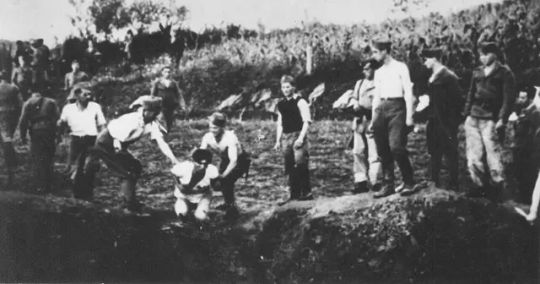
The Croatian fascist Ustaše militia prepare to execute prisoners near the Jasenovac concentration camp.
30 notes
·
View notes
Link
Never forget
#history#Croatia#Ustashe#Nazi#war crimes#genocide#barbarity#atrocities#Jasenovac#death camps#Catholic#ratlines#impunity#Argentina
0 notes
Text

Nadir and Fatima Dedić, survivors of the Jasenovac concentration camp, endured immense suffering during World War II. Nadir, arrested in 1942 on false charges, was subjected to brutal conditions in the camp where thousands of Roma were killed by the Ustasha regime. Fatima, his wife, survived alongside him for four and a half months of unimaginable terror. Their harrowing experiences and testimonies serve as powerful reminders of the atrocities faced by the Roma community during the Holocaust and highlight their resilience and courage in the face of adversity.
0 notes
Text








“The killing process in Auschwitz was more sterile and cleaner, with some distance between the murderers and their victims, whereas the killing process in Jasenovac was more direct, and the murderers enjoyed looking at their victims being murdered and tortured and did not need any physical distance during the execution of their crimes. This point demonstrates that the Ustasha killers acted according to more barbaric lines of behaviour than the Germans, a fact which even German visitors to Jasenovac mention in their reports. In this sense, the report of the General Gleise von Horstenau, German military envoy to Zagreb is worthy of note. For the German officers the methods of Ustasha killing were too wild and too barbaric in comparison to the system enacted in the factories of death (Auschwitz Birkenau, Chelmno, Belzec, Treblinka, Majdanek, Sobibor, Maly Trostenec). Despite their demonic crimes, the Germans still wanted to be considered cultured.
Photos which exist show us the amusement and fun of the Ustasha murderers while preforming their crimes. They did not have psychological problems while doing their cruel deeds nor did they feel any twinge of conscience. This difference allows us to state that the killing process in Jasenovac was much more barbaric, brutal and primitive (Greif, 2020a, pp. 560-561). The “sophistication” needed by the Germans to protect their “soul”, was not needed by the Ustasha killers…The Ustasha however, were very happy to dirty their hands and the bloodier their hands, the happier they were.”
Gideon Greif
(Israeli historian who specialized
in the history of Holocaust)
3 notes
·
View notes
Text

Vukasin of Klepci was a Serbian Orthodox Christian from Herzegovina who was martyred by fascists during World War II for refusing to acknowledge the Ustashi leader.
Little is known about the life of Vukasin Mandrapa before his martyrdom, except that he was a farmer and merchant. What is known about him is from the events resulting in his martyrdom. He was born in the village of Klepci, in Herzegovina, towards the end of the nineteenth century. He and his family lived in Sarajevo and then returned to Klepci. At the beginning of World War II, in 1942, members of the Croatian fascist Ustasas arrested him and transported him, together with other Serbs of that region, into the notorious concentration camp of Jasenovac (the number of victims at this camp have been estimated to be 700,000), for both their Serbian ethnicity and for refusing to convert from Serbian Orthodox Christianity to Roman Catholicism. At least two nephews of his are said to have died in Jasenovac before he did.

After horrible days full of hard labor, in January of 1943 Vukasin was brought before an Ustashi soldier, Josep "Zile" Friganovic, who threatened to execute him due to his stoic behavior during the forced labor days and a contest of four soldiers one night as to who could slaughter the most prisoners, but who said he would spare his life if Vukasin cried loudly: "Long live Ante Pavelic!" Ante Pavelic was the leader of the Ustashi. Vukasin, who saw a knife in the hands of the soldier, replied calmly: "My child, you do what you must,"* and refused to obey the soldier`s request. The Ustashi soldier brandished his knife and cut off Vukasin's ear. The soldier then repeated his request. Vukasin repeated his answer. The soldier then cut off Vukasin's other ear, followed by his nose, and then scarred Vukasin's face. Next his tongue was cut. After repeating the request to Vukasin to utter the vicious words and hail the leader of the Ustashi (Ante Pavelic), Vukasin once again calmly replied: "My child, you do what you must." After gouging out his heart and slitting his throat, Friganovic is said to have been unable to kill more people that night, fallen into alcoholism, and years later he confessed this to a doctor named Nedelko Nedo Zets, who wrote it down. This testimony would be used later to make Vukasin Mandrapa a saint:
"Franciscans Pero Brzica, Ante Zrinusic-Sipka and me, made a bet on who will kill more inmates in one night. The slaughter began and after one hour I was well ahead of all the rest by the number of the slaughtered.
Some unusual delirium came over me that night, I felt like in seventh heaven. I never felt such bliss in my whole life. After several hours, I managed to kill 1.100 people, while others killed only 300-400 people. By chance, at the hight of my delirium, I took one glance on the side, and I saw one peasant man who was rather old.
He watched me slaughter my victims and witnessing them dying in pain, with some incomprehensible peace. His look struck me, I felt like I was petrified, and I lost the delirium feeling. I couldn’t move couple of seconds. Then I approached him, and he told me that his name is Vukashin, from Klepci village near Capljina, and ustashe killed all his family. He was sent to Jasenovac death camp, for some forest works.
He was saying that with some inconceivable peace that struck me more than all horrifying cries around me. Suddenly, I got the flaming desire to break his peace and serenity by fiercest torture, and to restore my bliss in killing people by watching his pain. I singled him out and sat him down on one stump. I ordered him to yell “Long live fuhrer Pavelic” or I will cut off his ear.
Vukashin was silent. I cut off his ear. He didn’t say a word. I told him again, yell “Long live to fuhrer Pavelic” or I will cut off the other ear. He was silent again. I cut the other ear. “Yell “Long live Pavelic, or I will cut off your nose. When I ordered him to yell “long live Pavelic” for the fourth time or I will rip his heart out, he looked at me, as if he looked trough me into uncertainty, and said calmly and clearly:
”Just do your job, child”.
These words of his made me go completely wild. I jumped at him, gouged out his eyes, rip his heart out, slashed his throat all the way from one ear to another, and pushed him into the whole by my legs. But, then something broke inside of me, and I couldn’t kill anyone else that night. Franciscan Pero Brzica won, by killing 1.350 camp inmates. I paid the agreed bet, without a word”.

4 notes
·
View notes
